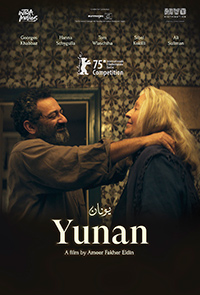Nothing is Everything: Eldin’s Continuing Exploration of Existential Crisis
 For his sophomore film Yunan, intended as the second chapter in a thematic trilogy following 2021’s The Stranger, director Ameer Fakher Eldin presents a parable within a parable as a disillusioned writer contemplates suicide. The milk of human kindness, and what appears to be a metaphorically biblical flood, reinvigorates his zest for life. Aided by accepting an epiphany, which basically regards the reality we are all destined to die and be forgotten (which Nirvana might have stated more eloquently as ‘all in all is all we are’), we follow him on his journey towards a peaceful reckoning to enjoy the present. Because we’re all going to live tomorrow if we don’t die today.
For his sophomore film Yunan, intended as the second chapter in a thematic trilogy following 2021’s The Stranger, director Ameer Fakher Eldin presents a parable within a parable as a disillusioned writer contemplates suicide. The milk of human kindness, and what appears to be a metaphorically biblical flood, reinvigorates his zest for life. Aided by accepting an epiphany, which basically regards the reality we are all destined to die and be forgotten (which Nirvana might have stated more eloquently as ‘all in all is all we are’), we follow him on his journey towards a peaceful reckoning to enjoy the present. Because we’re all going to live tomorrow if we don’t die today.
With his mother suffering from dementia and having forgotten his name, Munir (Georges Khabbaz), a noted writer, suddenly finds himself in an emotional crisis he cannot shake. He asks his mother to repeat a story she told about an unnamed shepherd who is cursed with nothing, but she can no longer seemingly complete the story. He leaves his dog with a woman he’s become intimate with and takes off for a remote island where he plans to kill himself. Once he arrives, the owner of the lone hotel on the island, Valeska (Hanna Schygulla) confirms he would need to have a reservation. But seeing Munir is desperate and exhausted, she lets him stay in an old, unused guest home only a couple kilometers away. Munir delays his plans, allowing himself to be fussed over a bit by Valeska, who lends him her son Karl’s (Tom Wlaschiha) bike and bends some of the other quaint rules of the establishment. Karl seems less than enthusiastic about Munir and is dismayed when Valeska allows him to stay when the rest of the island evacuates during what appears to be the most destructive storm they’ve seen in fifty years.
Eldin arguably seems a bit more fascinated with the glacial onslaught of depression fantasies than his audience, and makes painstaking literal reenactments of the cursed shepherd and his heavy hearted wife (played with silent somnolence by the noted Sibel Kekill and Ali Suliman, who inadvertently both feel a bit underutilized). Munir wanders about in these landscapes alongside them, his life appearing to parallel that of the shepherd, who we’re told countless times cannot see, hear, nor speak and has nothing (besides his beautiful wife with a smile like the scar on a pomegranate and a flock of sheep). The shepherd returns to a place he’s never been and that’s never changed, all the while having ‘nothing.’ And Munir’s physical journey mirrors the existential one on a Hallig, one of the marsh islands called the Halligen, which Valeska explains are technically different from islands because they’re subject to periodic flooding.
Munir’s initial plan to commit suicide while on the island initially bears resemblance to Abbas Kiarostami’s Taste of Cherry (1997) as he shows up unannounced looking for a room, exchanging barbs with Valeska, who eventually takes pity on him. Begrudgingly, Munir opens up to Valeska, who is played with warm mischievousness by the ever-beguiling Hanna Schygulla. The best moments of Yunan transpire between Munir and Valeska, but they become increasingly interrupted by her gruff son Karl, who also eventually extends an olive branch for his behavior but always feels a bit extraneous.
When we make it to the end of Yunan and Munir has at last grasped the meaning of his ailing mother’s parable, the film also, at last, firmly establishes a sense of eloquence, even though it isn’t particularly a revelation for anyone else but Munir. Still, as an exercise on the inherent power which resides in the kindness of strangers, Eldin’s poetic posturing might outstay its welcome, but it’s a welcome message, nonetheless.
Reviewed on February 19th at the 2025 Berlin International Film Festival (75th edition) – Main Competition. 124 mins.
★★½/☆☆☆☆☆


